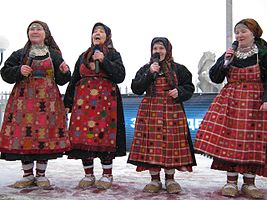Buranovskiye Babushki (Russian: Бурановские бабушки, pronounced [bʊˈranəfskʲɪ(j)ɪ ˈbabʊʂkʲɪ]; Udmurt: Брангуртысь песянайёс, romanized: Brangurtyś pesänajos; both meaning "Buranovo Grannies") is an Udmurt-Russian ethno-pop band comprising eight elderly women from the village of Buranovo, Udmurtia. Buranovskiye Babushki represented Russia at the Eurovision Song Contest 2012 in Baku, Azerbaijan, where they finished second.[1]
Buranovskiye Babushki Бурановские бабушки | |
|---|---|
 Buranovskiye Babushki in 2011 | |
| Background information | |
| Origin | Buranovo, Udmurtia, Russia |
| Genres | Pop, ethno |
| Years active | 1970–2018 |
| Members |
|
| Past members |
|
| Website | buranovskiebabushki |
History
editEurovision Song Contest
editThe group had previously participated on Russia's Eurovision song selection in 2010 with the song "Dlinnaja-dlinnaja beresta i kak sdelat' iz nee ajšon" ('Very long birch bark and how to turn it into a turban'), where they finished third.[2]
They made another attempt to represent Russia by participating on Russia's Eurovision song selection in 2012 with the song "Party for Everybody", which was sung partially in English. The group eventually won, receiving 38.51 points ahead of Eurovision 2008 winner Dima Bilan who also entered the contest with T.A.T.u. member Yulia Volkova with the song "Back to Her Future", which finished second, receiving 29.25 points. They represented Russia in the Eurovision Song Contest 2012 in Baku, Azerbaijan. The group finished in 2nd place with 259 points, receiving points from 40 countries out of eligible 41 (excluding Switzerland), and were behind the winning country, Sweden, who scored 372 points.[1][3]
The group said that in 2012 they would use any money raised to build a church in Buranovo.[1]
Fundraising for church rebuilding
editIn 2010, the group started a fund for the rebuilding of Trinity Church in Buranovo and all of the group's income is donated into this fund. The Trinity Church was originally built, of stone, in 1865, but was closed on 19 September 1939 by the Soviet administration and demolished. The present wooden church is in poor condition.
The brick structure of The Holy Trinity church has been completed.
The church was finally opened and consecrated on 20 June 2016.[4]
Members
editIn 2014, Producer Ksenia Rubtsova ended the contract with the original grandmothers and recruited a new line-up of 8 primary grandmothers, including Anna Prokopyeva and Valentina Serebrennikova, and 12 back-up grandmothers.[5] The new grandmothers are from a variety of villages in Udmurtia.[5] The former grandmothers continue to perform under the name "Бабушки из Бураново" (Grandmothers from Buranovo). [5]
- Grania Baysarova (born 1949)[6]
- Alevtina Begisheva (born 1958)[6]
- Zoya Dorodova (born 1940)[6]
- Valentina Pyatchenko (born 1937)[6]
- Olga Tuktareva (born 1968)[6]
- Nikolay Zarbatov (born 1963 or 1964)[6]
Former
editCritical reception
editRussian critics noted that the success of "Buranovskiye Babushki" on Eurovision-2012 was influenced by Russian acts like "Ivan Kupala".[10][11][12]
References
edit- ^ a b c "Granny group to represent Russia". BBC News. 8 March 2012. Archived from the original on 28 September 2018. Retrieved 20 June 2018.
- ^ Simon Barclay (17 June 2010). The Complete and Independent Guide to the Eurovision Song Contest 2010. Simon Barclay. p. 19. ISBN 978-1-4457-8415-1. Retrieved 10 March 2016.
- ^ "Grand Final of Baku 2012". Eurovision Song Contest. Archived from the original on 10 May 2019. Retrieved 10 May 2019.
- ^ "Храм, который построили "Бабушки из Бураново", сегодня освятили - ВИДЕО | Моя Удмуртия" [Today the church built by "Buranovskiye Babushki" was consecrated - VIDEO]. Моя Удмуртия (My Udmurtia) (in Russian). 20 June 2016. Archived from the original on 25 February 2017. Retrieved 24 May 2021.
- ^ a b c d "«Бурановских бабушек» заменили на молодых". KM.RU. 29 September 2014. Retrieved 14 May 2022.
- ^ a b c d e f g h i j "Istoriya sozdaniya i biografiya "Buranovskikh babushek"" История создания и биография "Бурановских бабушек" [History of creation and biography of "Buranovsky grandmothers"]. Buranovskiye Babushki. Archived from the original on 13 March 2016. Retrieved 10 March 2016.
- ^ Adams, William Lee (21 January 2014). "In Memoriam: Buranovskiye Babushki Yelizaveta Zarbatova dies". Wiwibloggs. Archived from the original on 29 August 2016. Retrieved 10 May 2019.
- ^ Shamaeva, Yana (26 October 2019). "В Удмуртии умерла самая популярная солистка бурановских бабушек" [In Udmurtia, the most popular soloist of Buranovsky grandmothers died]. Rossiyskaya Gazeta (in Russian). Archived from the original on 26 October 2019. Retrieved 26 October 2019.
- ^ Новости (23 July 2024). "Умерла участница "Бабушек из Бураново" Екатерина Шкляева". РИА Новости (in Russian). Retrieved 23 July 2024.
- ^ Дмитрий Данилов. (21 March 2012). "Сверхновые русские бабки". Русский Яппи. Archived from the original on 5 March 2016. Retrieved 4 May 2012.
- ^ Елена Чишковская. (14 March 2012). ""Бурановские бабушки": Party по-удмуртски". Нескучный сад. Retrieved 6 May 2012.
- ^ Сергей Ефимов. (13 March 2012). ""Бурановские бабушки" дарят нам свои сердца»". Комсомольская правда. Retrieved 6 May 2012.